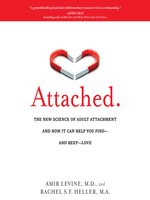by Amir Levine
—John Gray, PhD., bestselling author of Men Are from Mars, Women Are from Venus
We already rely on science to tell us what to eat, when to exercise, and how long to sleep. Why not use science to help us improve our relationships? In this revolutionary book, psychiatrist and neuroscientist Dr. Amir Levine and Rachel Heller scientifically explain why why some people seem to navigate relationships effortlessly, while others struggle.
Discover how an understanding of adult attachment—the most advanced relationship science in existence today—can help us find and sustain love. Pioneered by psychologist John Bowlby in the 1950s, the field of attachment posits that each of us behaves in relationships in one of three distinct ways:
• Anxious people are often preoccupied with their relationships and tend to worry about their partner's ability to love them back• Avoidant people equate intimacy with a loss of independence and constantly try to minimize closeness.
• Secure people feel comfortable with intimacy and are usually warm and loving.
Attached guides listeners in determining what attachment style they and their mate (or potential mate) follow, offering a road map for building stronger, more fulfilling connections with the people they love.
*Includes a PDF of the attachment style questionnaire
—John Gray, PhD., bestselling author of Men Are from Mars, Women Are from Venus
We already rely on science to tell us what to eat, when to exercise, and how long to sleep. Why not use science to help us improve our relationships? In this revolutionary book, psychiatrist and neuroscientist Dr. Amir Levine and Rachel Heller scientifically explain why why some people seem to navigate relationships effortlessly, while others struggle.
Discover how an understanding of adult attachment—the most advanced relationship science in existence today—can help us find and sustain love. Pioneered by psychologist John Bowlby in the 1950s, the field of attachment posits that each of us behaves in relationships in one of three distinct ways:
• Anxious people are often preoccupied with their relationships and tend to worry about their partner's ability to love them back• Avoidant people equate intimacy with a loss of independence and constantly try to minimize closeness.
• Secure people feel comfortable with intimacy and are usually warm and loving.
Attached guides listeners in determining what attachment style they and their mate (or potential mate) follow, offering a road map for building stronger, more fulfilling connections with the people they love.
*Includes a PDF of the attachment style questionnaire





